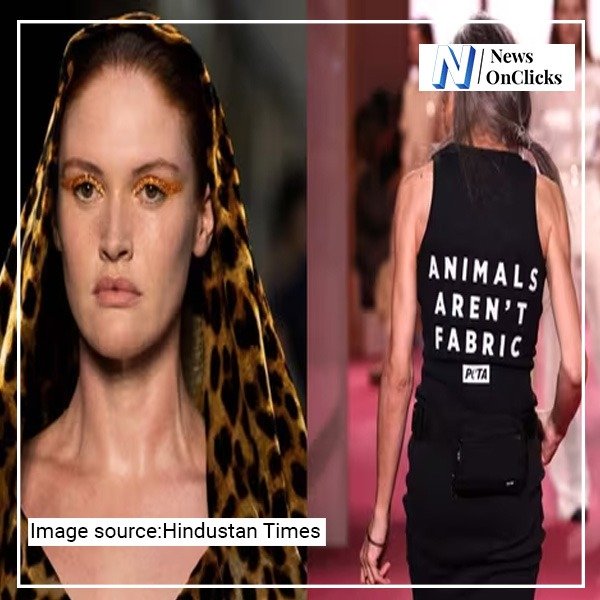
In an unprecedented move, the British Fashion Council (BFC) has made history with its groundbreaking decision to ban exotic animal skins from being showcased at London Fashion Week 2025. This bold step marks a turning point in the world of high fashion, one that not only challenges industry norms but also responds to growing concerns about sustainability, animal rights, and the future of fashion. The decision, set to take effect in 2025, strongly emphasizes the need for a more ethical and sustainable approach in one of the world’s most influential fashion capitals.
For years, the fashion industry has faced mounting pressure to adopt more sustainable practices and reconsider its reliance on exotic animal skins, often used for luxury clothing and accessories like fur, snakeskin, and alligator leather. London Fashion Week, as one of the major global fashion events, has long been a symbol of luxury, creativity, and innovation. The BFC’s decision to ban exotic animal skins is a reflection of changing attitudes within the fashion industry, where environmental and ethical considerations are no longer sidelined but are, instead, coming to the forefront of the conversation.
The History and Impact of Exotic Animal Skins in Fashion
Exotic animal skins have been a part of luxury fashion for centuries. From fur-lined coats to alligator leather handbags, these materials have long symbolized wealth, power, and prestige. However, as consumers have become more aware of the environmental impact and the cruelty associated with the use of exotic animal skins, the demand for these products has significantly decreased.
Animal rights activists have long campaigned against the use of animal skins in fashion, arguing that the practice not only harms animals but also contributes to environmental degradation. The production of exotic skins involves unsustainable farming practices, often leading to deforestation, habitat destruction, and a significant carbon footprint. Moreover, the killing of animals for their skins raises concerns about ethical treatment and animal welfare.
As these concerns have grown, fashion houses and designers have faced increasing scrutiny. Brands such as Gucci, Burberry, and Prada have already made moves toward eliminating fur from their collections. However, the use of exotic skins, like python, crocodile, and ostrich leather, has remained more entrenched in the luxury fashion market, often due to their high price tags and association with exclusivity. The BFC’s decision to ban these skins signals a broader shift towards embracing animal-free alternatives and sustainable innovation in the fashion industry.
Why the Ban by British Fashion Council is Groundbreaking?
The British Fashion Council’s decision to ban exotic skins from London Fashion Week 2025 is a landmark moment for the fashion industry. This is the first time that a major fashion event has imposed such a comprehensive ban, making it a significant milestone in the broader movement toward sustainable fashion.
This ban sets a precedent that could inspire other fashion weeks around the world, including those in Paris, New York, and Milan, to adopt similar measures. The BFC’s stance aligns with the growing demand for transparency and accountability in the fashion supply chain, as consumers increasingly demand ethical and sustainable practices from the brands they support.
Moreover, the ban underscores the fashion industry’s potential to lead the charge in changing attitudes toward sustainability. As one of the world’s most influential sectors, fashion has the power to shape societal trends and norms. By refusing to showcase exotic animal skins, the BFC is demonstrating that luxury can be redefined without sacrificing ethical and environmental standards.
Decision by British Fashion Council Empowering Sustainable Fashion
The BFC’s decision comes at a time when sustainability is increasingly becoming a central focus within the fashion industry. Consumers, particularly younger generations, are more conscious of the impact their purchasing decisions have on the planet and its inhabitants. Fast fashion, once hailed as a democratizing force, has now come under fire for its environmental and social implications. As a result, many fashion enthusiasts are shifting toward sustainable alternatives, seeking out brands that prioritize ethical sourcing, fair labor practices, and eco-friendly materials.
The rise of sustainable fashion has given birth to a new wave of innovation, with designers exploring materials like plant-based leather, organic cotton, and synthetic fur. Additionally, the growing popularity of upcycling and clothing rental services further highlights the fashion industry’s potential for transformation.
The BFC’s ban is a powerful signal that sustainable fashion is not just a passing trend, but a fundamental shift in how the industry operates. By placing the ban on exotic skins, London Fashion Week is embracing a future where luxury and sustainability are no longer mutually exclusive. Designers and brands that continue to rely on animal skins may face a growing backlash as more consumers and industry players demand cruelty-free alternatives.
Ethical and Environmental Concerns Behind the Ban
One of the primary motivations behind the decision of British Fashion Council is the increasing concern about the environmental and ethical implications of exotic animal skins. The process of farming and harvesting exotic animals for their skins involves significant harm to both the animals and the ecosystems in which they live.
Farmers often confine, mistreat, and slaughter these animals inhumanely. They process the skins using toxic chemicals, which pollute soil and water. Additionally, the farming of exotic animals for their skins often leads to the destruction of habitats, putting pressure on already endangered species and disrupting delicate ecosystems.
As the demand for sustainable fashion grows, there is a strong push for the industry to adopt alternatives that are both cruelty-free and eco-friendly. Materials like plant-based leathers, bio-based synthetics, and lab-grown materials are emerging as viable alternatives to animal skins, offering the luxury and durability of exotic materials without the ethical and environmental costs.
What Does This Mean for Designers and Fashion Houses?
The BFC’s decision is likely to have a profound impact on designers and fashion houses that have traditionally relied on exotic animal skins. While the ban only affects London Fashion Week, its influence will likely ripple across the global fashion scene. Designers may now feel a greater pressure to find innovative alternatives to exotic skins, whether by turning to sustainable materials or reimagining luxury fashion in new, creative ways.
In the long term, this could lead to a broader shift in the way fashion houses design and produce their collections. Many high-end brands are already experimenting with sustainable materials and embracing circular fashion models. The BFC’s decision could accelerate this shift, encouraging designers to push the boundaries of what is possible in terms of eco-conscious fashion without compromising on luxury or craftsmanship.
The Road Ahead for London Fashion Week
With the BFC’s historic decision, London Fashion Week 2025 is poised to be a turning point for the global fashion industry. As one of the first fashion weeks to ban exotic animal skins, it will be watched closely by other fashion capitals and industry leaders.
The success of this initiative will depend on how well the industry can adapt to the new guidelines. Designers, manufacturers, and suppliers will need to collaborate to ensure that they have access to sustainable alternatives that meet the high standards of quality and luxury expected at London Fashion Week. If this ban proves successful, it could pave the way for other fashion weeks to follow suit, further advancing the movement toward more ethical and sustainable fashion practices worldwide.
Conclusion: A New Era for Fashion
The British Fashion Council’s decision to ban exotic animal skins at London Fashion Week 2025 is a groundbreaking move that sets a powerful precedent for the fashion industry. It highlights the growing demand for sustainability and ethical practices in fashion and sends a clear message that luxury fashion can no longer rely on animal cruelty and environmental destruction.
As we look ahead to 2025, it’s clear that the fashion industry is at a crossroads. The decision by the BFC is not just a ban; it’s a call to action for designers, brands, and consumers alike to embrace a more sustainable, ethical future. The future of fashion is here, and it’s animal-free, eco-conscious, and brimming with innovation. The British Fashion Council has made history, and the world is watching to see how this move will shape the future of luxury fashion.









